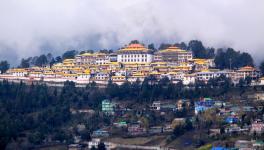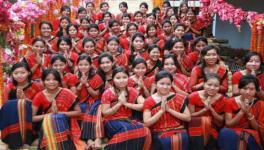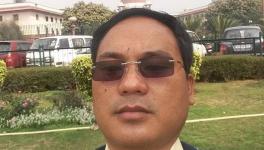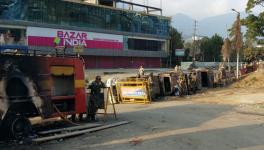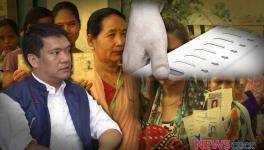Arunachal Pradesh: Why the Chakma-Hajong Issue Needs Speedy Resolution
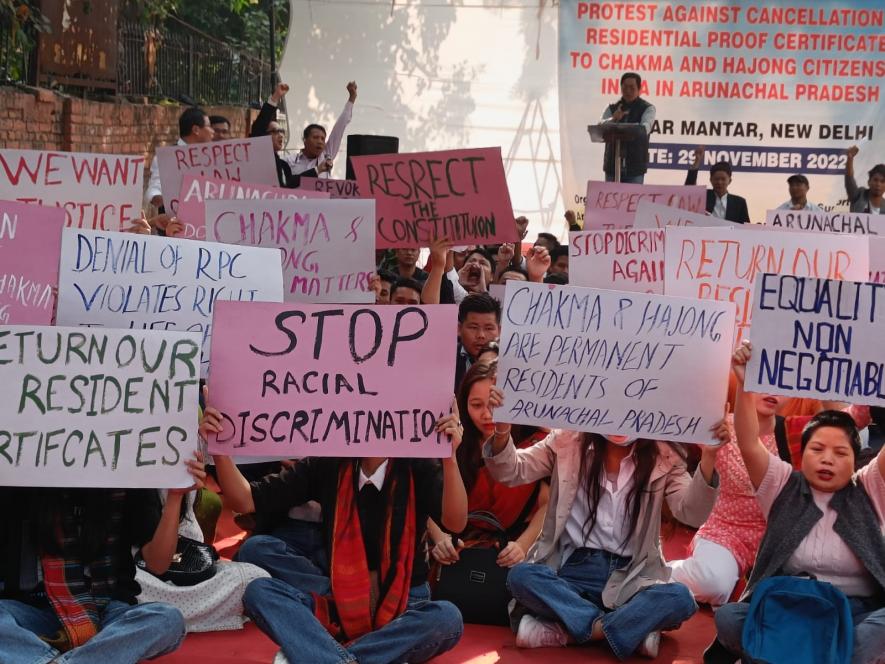
Image Courtesy: Tagia Tania
In a recent address, Arunachal Pradesh Chief Minister Chief Minister Pema Khandu stated that whenever he visited the eastern part of the state and met Chakma and Hajong tribes, he felt sad to see that they had no facilities, their housing conditions were bad and many of them were living below poverty line.
Khandu further stated that he would call the Chakmas and Hajongs to resolve the long-standing issue of citizenship (both are migrant tribes) in a three-day programme for trainers, commemorating the National Panchayati Raj Day at Itanagar. He also said the Chakma-Hajong problem would be resolved by distributing them in different states of India.
Read Also: Arunachal: Chakma and Hajong Tribes Protest to Get Rid of the 'Refugee' Tag
While the government of Arunachal Pradesh considers Chakma- Hajongs as refugees, both the communities have been voting for the past 60 years. Now, since the general election is on the way (in 2024), the Khandu-led Bharatiya Janata Party (BJP) government seems to be making another attempt to confuse both sides and use them as “puppets” for electoral gains.
On the one hand, the state government and certain indigenous communities are adamant on relocating these two communities, the Chakmas-Hajongs have made it clear that they need ‘resolution not relocation’.
Read Also: The Question of Citizenship: Chakma and Hajong vs State of Arunachal Pradesh
The Chakmas and Hajongs were settled in Arunachal Pradesh between 1964 -69 by the Indian government. Their original population was around 5,000, but at present, it is said to be close to one lakh. The Chakmas primarily adhere to Buddhism, while the Hajongs follow customs that are a mix of Hinduism and animism. The two communities are living in a precarious condition, as some indigenous communities in the Northeastern state have been demanding their ouster from the state.
The Chakmas and Hajongs belong to the Tibeto-Mongoloid race. Initially, the communities were residents of the Chittagong Hill Tracts of erstwhile East Pakistan. They had to flee when the Kaptai dam project submerged their land. The Hajong people also faced religious persecution in East Pakistan (now Bangladesh). They entered India through the then Lushai Hills district of Assam (now Mizoram).
The Supreme Court 1996, in a judgement, has given full rights to the Chakmas and Hajongs as citizens of India, but the state government doesn’t consider the judgement as helpful in the betterment of the state.
In 2020, the Arunachal Pradesh Assembly passed a resolution to bring the state under the ambit of Sixth Schedule of the Constitution, besides amending Article 371(H) to bring in provisions to safeguard tribes in the state in which “outsiders” were not to have any permanent settlement in this area.
Hence, the Arunachal Pradesh government is now trying to settle these communities in neighbouring states through a process of dialogue and agreements. But all these moves are being rejected by the Chakmas and Hajong Alliance, who say they will only consider talks if settlement of the people is done within the state.
Earlier, the Chakmas-Hajongs were getting “residential proof certificates” required for job interviews and other purposes, but now these have been cancelled following a stir by the All Arunachal Pradesh Students Union (APPSU), which claims support of indigenous outfits, stating that this might give these two tribes “an opportunity to settle permanently in the state and make the local inhabitants a minority.”
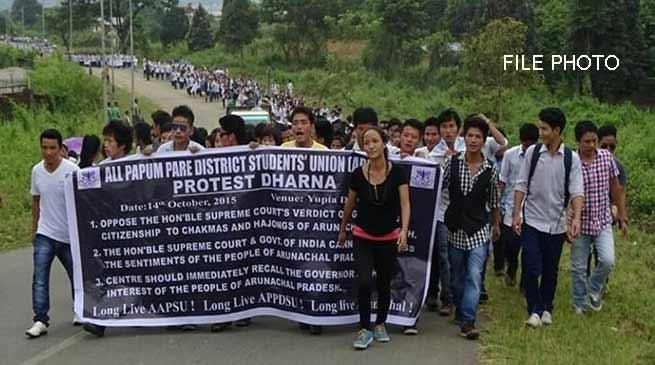
“As per Chief Minister Khandu’s announcement, the proposal for a dialogue between Chakmas and Hajongs Alliance and the state government has been rejected by the Chakmas and Hajongs. The communities are demanding that unless the issue is settled within the boundaries of the state, they will not sit on the dialogue table. The chief minister is trying to settle this community outside the state and have a dialogue with other states, which is not acceptable to the Chakmas and Hajongs, because after 60 years of the settlement here, where will they go?” Suhas Chakma, president of Chakma Development Foundation of India, told the media.
The state government needs to clarify its stance on this demand, which is simple but is being made complicated, he added.
The communities, especially Chakma, is not seeking anything that is not given to the citizen of India, say, voter ID cards, ration cards etc. They are not demanding any special benefits given to the Schedule Tribe (ST) communities, they are simply asking for rights given to the people of Bihar, West Bengal, Assam etc. who are residing and working within the state. The communities are not asking for PRCS (Permanent Resident Certificate), all they are asking for is just one document that indicates proof that you are a resident of a particular state, Suhas Chakma added.
Nabam Gandhi, vice-president, protocol, of APPSU, has stated to the media that “In 2022, the new leadership of APPSU raised the issue of the Chakmas PRCS from the local administration since 2016. But no gazette notice from the state government was advertised for issuing these certificates to the Chakmas and Hajongs. The APPSU, therefore, urged the state government to cancel their ‘residential proof certificates’ and further called for suspension of two government officials -- SavadamTayang EAC and S. Roy EAC -- for issuing these certificates to Chakmas and Hajongs.”
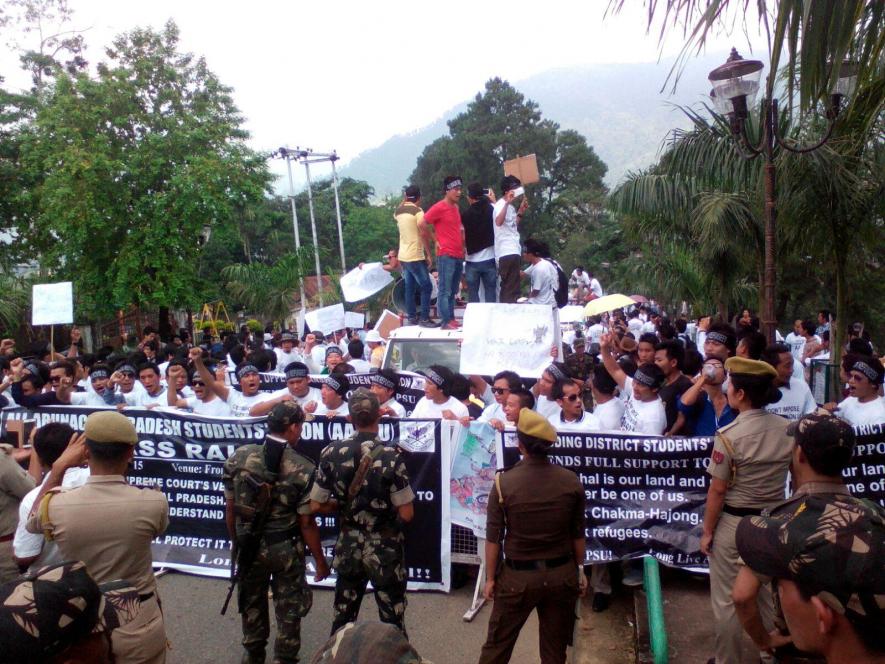
As of now, the situation in Arunachal Pradesh is complicated and precarious, with outfits like APPSU, claiming support from indigenous communities, demanding that the Chakma-Hajongs be declared “ousiders”, while the two communities fear losing their identity and land. The state government, which is playing the role of the moderator, however, seems to be using both communities as puppets with an eye on the general elections.
With Manipur already on the boil in the neighbourhood, the Arunachal government needs to make serious attempts to resolve this issue as quickly as possible so that peace and harmony can prevail.
The writer is an independent journalist. The views are personal.
Get the latest reports & analysis with people's perspective on Protests, movements & deep analytical videos, discussions of the current affairs in your Telegram app. Subscribe to NewsClick's Telegram channel & get Real-Time updates on stories, as they get published on our website.










